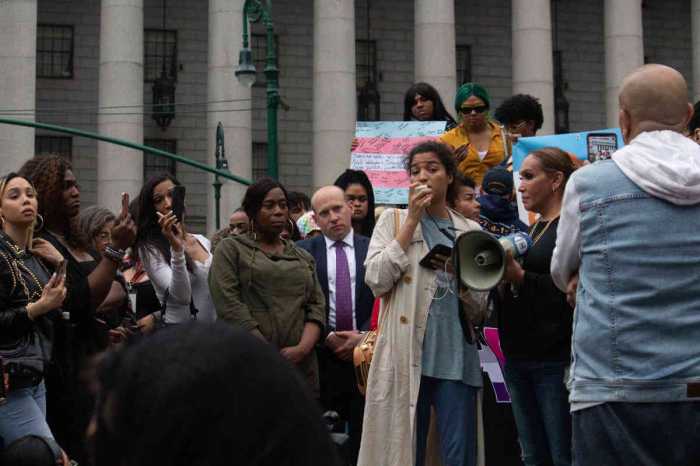Officials from the city’s Department of Correction stumbled at various points and were challenged by councilmembers and advocates at a May 1 City Council hearing about the treatment of transgender and gender non-conforming and intersex (TGNCI) people in DOC custody. They made one point crystal clear, however: the department opposes proposed commonsense legislation that would implement a task force focusing on policies surrounding TGNCI people in city jails.
The first two of five proposed bills that were discussed, Int. 1513 and Int. 1514, would require DOC facilities housing TGNCI people to provide access to comprehensive mental health and substance abuse treatment, while Int. 1530 and 1532 would direct the department to create and report on an independent appeals process for those who are denied housing requests — an apparent response to concerns that the department is failing in its responsibility to house people in accordance with their gender identity. The final bill, Int. 1535, calls for the task force.
“While we appreciate the spirit of collaboration of [Int. 1535], the department cannot support this legislation,” said Faye Yelardy, the assistant commissioner for the DOC’s Office of Sexual Abuse and Sexual Harassment Prevention, who went on to justify the department’s opposition to the bill by saying the task force should not exist if it consists of people who do not have a correctional services background.
“In addition, we have serious concerns about potentially sharing sensitive and confidential information with individuals who lack authority to possess access to this information,” Yelardy added in her testimony in front of the Committee on Criminal Justice.
The DOC did not commit to fully supporting or opposing any of the other bills. On some pieces of legislation, officials indicated a desire to make changes before considering support. On others, the department condescendingly suggested the measures aren’t necessary because the systems currently in place are already sufficient for LGBTQ people in custody.
That position was later blasted by advocates, including attorneys who have represented numerous transgender inmates, who said trans people continue to face problems in city jails. It was only last year that the department started housing individuals in custody based on gender identity in accordance with an executive order issued by Mayor Bill de Blasio in 2016.
Yelardy said the department supports “the spirit of” the bills requiring mental health and substance abuse treatment at the jails, but appeared to suggest they might not be necessary, stating that the DOC “will continue to ensure” that all people in its custody would receive health care access “whether legislated to or not.”
The DOC also sounded tepid about an independent appeals process created by the City Council. Officials at one point said the DOC is designing its own appeals process that would allow for review by “parties not involved in the original decision process,” and that they hope to work with the City Council toward legislation that “supports fairness and safe housing for all.”
Currently, appeals are handled internally.
Committee Chair Keith Powers of Manhattan rejected the department’s plea for longer time, stating that an independent appeals process is long overdue, as it was supposed to be implemented in 2014.
“We’re five years past when you were supposed to set one up,” he said. “And now you’re asking for more time?”
The DOC had less to say about the bill requiring reporting on the appeals process. Yelardy said the DOC “supports the general premise” of bill, but added the department seeks to work with city councilmembers “on the metrics and wording” to avoid duplicating information already provided to the Board of Correction, an oversight body.
The DOC stated that, according to the most recent statistics, there are 50 transgender people in custody, including three transgender men.
Throughout the hearing, the DOC repeatedly called itself a “national correctional leader” in housing people based on gender identity, but advocates weren’t buying it.
Deborah Lolai, who is a criminal defense attorney and LGBTQ crime specialist with the Bronx Defenders, said the DOC has not properly followed de Blasio’s executive order requiring that people be housed in accordance with their gender identity.
“I have to say, contrary to what has been testified, that is not happening,” said Lolai, who noted that she represents hundreds of transgender people every year. “The majority of trans women who I represent who have been incarcerated have been in a male facility. Contrary to what has been testified to, they are not there by choice.”
Multiple attorneys who testified also rejected the DOC’s assertion earlier in the hearing that the department strives to act within 24 on requests by those who wish to be placed in transgender housing. Among the transgender people she has represented, Lolai said, no such requests have been processed within 24 hours — and that the DOC sometimes makes its decisions based on an entirely different standard.
“It seems to me from patterns that I’ve been seeing that the department largely determines decisions based on how feminine a woman presents,” she said.
Incarcerated TGNCI individuals have experienced significant danger nationwide, regardless of whether they are in local custody or federal custody. Immigrants seeking asylum have been particularly affected, perhaps most notably in the case of Roxsana Hernandez, a Honduran woman who died in the custody of Immigrants and Customs Enforcement (ICE) last year and was found to have suffered bruises consistent with abuse, according to an independent autopsy.
In another case, the American Civil Liberties Union of New Mexico and the National Immigrant Justice Center took legal action against ICE last month after another transgender woman from Honduras, Nicole Garcia Aguilar, continued to be held in custody six months after successfully winning asylum in the United States.



































